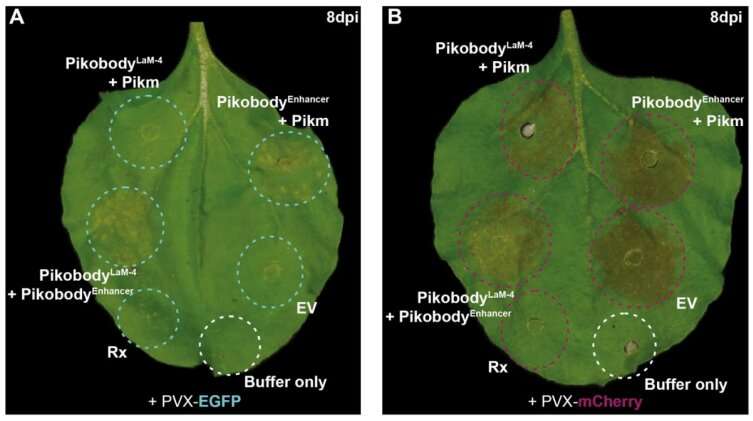March 3, 2023 report
This article has been reviewed according to Science X's editorial process and policies. Editors have highlighted the following attributes while ensuring the content's credibility:
fact-checked
peer-reviewed publication
trusted source
proofread
Giving plants animal antibodies to help them ward off diseases

A team of biotechnology researchers working at the University of East Anglia has developed a new way to increase disease resistance in plants—give them animal antibodies. In their paper published in the journal Science, the group describes engineering llama and alpaca antibodies in a way that allowed them to fight a type of fungus in plants.
Prior work has shown that animals are much better at fighting off diseases caused by microbes than plants are. Plant infection sites simply die and drop to the ground. If too many parts die, the plant dies. Animals, on the other hand, have complex immune systems that involve creating new antibodies when new threats are discovered, often taking as little as a few weeks. In this new effort, the researchers wondered if it might be possible to borrow some of an animals' immune system to help plants fight off infections.
To find out, the research team built on other work, such as that conducted by a team at the Whitehead Institute for Biomedical Research—they came up with a way to use alpaca-derived, single-domain antibody fragments to perturb cellular processes in mammalian cells.
In the new study, the team created what they call pikobodies—antibodies from llamas and alpacas that had been fused with the Pik-1 protein. In nature, the protein is typically found in plants similar to tobacco plants—it helps detect a protein that allows a type of blast fungus to infect cells in the plants. The team also engineered the antibodies to attack fluorescent proteins.
Next, the team injected the pikobodies into various types of plants and then exposed them to the fungus. They found that cells in the plants exposed to the fluorescent proteins were killed, leaving behind brown patches on the leaves of the plant. They tested 11 versions of their pikobodies and found that four were not only not lethal to plant cells, but killed only those cells with specific proteins, showing that using such a strategy to help plants defend themselves is possible.
The researchers also found that their different versions of pikobodies could be combined in different ways to give plants multiple ways to fight a single disease.
More information: Jiorgos Kourelis et al, NLR immune receptor–nanobody fusions confer plant disease resistance, Science (2023). DOI: 10.1126/science.abn4116.
On bioRxiv: DOI: 10.1101/2021.10.24.465418
Journal information: Science
© 2023 Science X Network





















